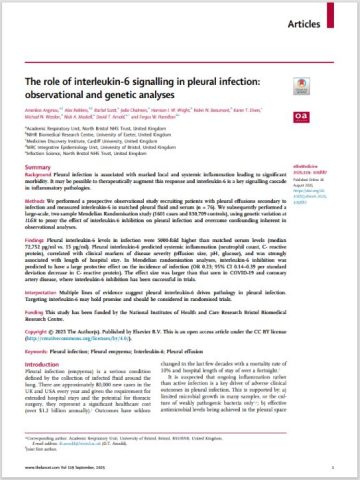Does inflammation play a role in pleural empyema?
Theme Respiratory disease
Workstream Personalised care in pleural disease
Status: This project is ongoing
Pleural empyema is a serious condition that develops when pus builds up in the space between the lungs and the chest wall (the pleural space). It can cause:
- Fever
- Chest pain
- Breathlessness
- A cough with mucous
It is not a common condition but can occasionally become life-threatening. Pleural empyema is associated with very severe inflammation.
Interleukin 6 (IL-6) is produced in the body wherever there is inflammation. IL-6 is a cytokine. Cytokines are small proteins produced by our cells. They play a vital role in the body’s immune system.
IL-6 levels are raised when an infection is present and can be targeted by monoclonal antibodies. Monoclonal antibodies are laboratory-produced proteins that bind to specific targets in the body. They are designed to mimic, enhance, or restore the immune system’s attack on unwanted cells.
Evidence confirming whether IL-6 drives pleural empyema development is limited. However, we do know that targeting IL-6 to treat other infections does have positive results.
Project aims
Our aim is to review the evidence that targeting IL-6 might have a role in treating pleural empyema.
We want to identify the relationship between:
- Pleural IL-6 and serum IL-6
- Pleural IL-6 and other markers of pleural empyema severity
Our work so far
We studied the levels of interleukin-6 in the fluid around patients’ lungs who had a pleural infection. We found those with a higher level of interleukin-6 in their lung fluid had more inflammation throughout their body, and more serious disease. Patients with higher interleukin-6 levels also spent longer in hospital.
To check that high interleukin-6 levels cause patients’ pleural infection to get worse, rather than being related to their pleural infection in some other way, we used a technique called Mendelian randomisation.
We studied DNA from groups of people with and without pleural infection and looked for genetic changes that are known to influence the effect of interleukin-6 on inflammation. We then investigated whether people in the sample groups with these genetic changes suffered from a pleural infection.
This showed that, when interleukin-6 activity was lower, people were less likely to have pleural empyema.
Previous studies have shown that inhibiting the activity of interleukin-6 reduces the chance of developing COVID-19 and coronary artery disease. We found that inhibiting the activity of interleukin-6 reduces the chance of pleural infection by even more than it reduces the chances of these other diseases.
What we hope to achieve
We hope that our findings will allow us to apply for more funding to assess whether tocilizumab (a drug that attaches to IL-6 receptors and blocks their activity) would be effective in treating pleural infections.
